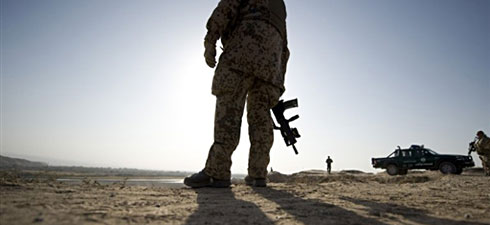German advocates of the Afghanistan intervention are cut to the quick. They have always claimed the moral high ground to sell the war. And promised a risk-free campaign. But both pillars of this construct have now collapsed in the wake of Obama’s Afghanistan address. The German government ought to concede by now that the new strategy mapped out by the US and its allies in Afghanistan is based on taking a sober view of the war. And yet without pathos, without the noble warrior myth, there would be no German involvement in this conflict to begin with: the red-green coalition under Schröder and Fischer would never have got any backing for the deployment of the first German troops. And now their successors are clearly afraid of losing the last scraps of support for the mission in the Hindu Kush.
Not only did Obama announce a rapid surge of US troops as well as plans to begin bringing them home in July of 2011, he redefined the war and its aims: it is no longer about democracy, human rights or the dream, harboured not only by the Bush administration, of using military might to build a better world. Instead of a vision, Obama has set forth a strategy. We don’t have to endorse it. Even the president himself does not seem all that convinced of its implementation. But at least Obama has now presented his plan to the public. And more importantly, he has spelled out the consequences in no uncertain terms. His German allies are far from doing anything of the sort. As the Bundestag now votes yet again to prolong the Bundeswehr’s mission in Afghanistan, it is acting as though there had been no change in Obama’s strategy, and as though the Bundeswehr had almost only just begun a hitherto successful campaign. After eight years in Afghanistan, the Bundestag is going to give the Bundeswehr a mandate which, as is plain by now if it wasn’t before, is outmoded.
The German government intends to talk it over with its allies. But not with its own parliament, let alone with the democratic sovereign: the people. The new transparency in German military policy that was announced only a week ago is already passé.
European Union
30,000 soldiers on the ground
The debate about the legitimacy and objectives of the Western effort in Afghanistan has been brewing since 2001, and is now taking off in several European countries after President Obama’s appeal for more troops. At present, the International Security Assistance Force (ISAF) has 71,000 soldiers deployed on the ground, close to 30,000 of whom hail from 25 different EU countries.
Under pressure from NATO Secretary-General Anders Fogh Rasmussen, Washington’s European allies are going to have to talk turkey on the future of their involvement. On 2 December, Poland said it was prepared to send another 600-strong contingent. The very next day Italy announced the deployment of 500 to 1,500 reinforcements. But The Netherlands, whose coalition government is divided on the issue, is sticking to its plan to pull out of Afghanistan by 1 December 2010, and France intends to wait for the international conference in late January before making up its mind whether to second instructors for the Afghan army. The UK, on the other hand, which provides the second-largest cohort after the US, has already announced the imminent deployment of another 500 men in uniform.
Was this article useful? If so we are delighted!
It is freely available because we believe that the right to free and independent information is essential for democracy. But this right is not guaranteed forever, and independence comes at a cost. We need your support in order to continue publishing independent, multilingual news for all Europeans.
Discover our subscription offers and their exclusive benefits and become a member of our community now!












